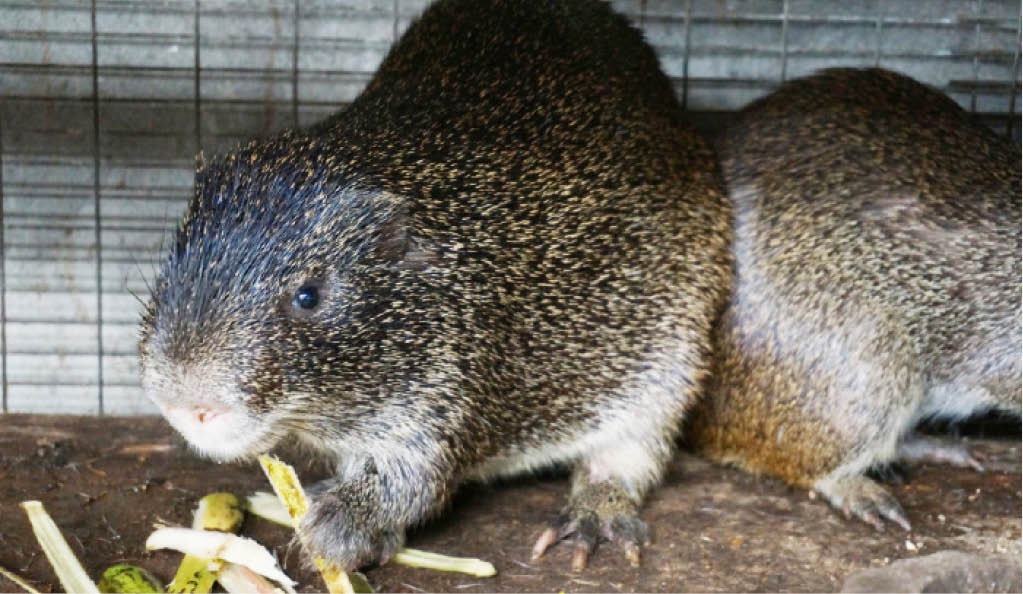How farmers can make millions from grasscutters
Very easy, cheap to start and maintain, grasscutter farming is said to be a highly profitable business in animal farming. It is also one of the most profitable animal husbandry businesses in Nigeria. If you are one of those still searching for a job, or a retired civil servant, you can grab the opportunities that […]

Very easy, cheap to start and maintain, grasscutter farming is said to be a highly profitable business in animal farming. It is also one of the most profitable animal husbandry businesses in Nigeria.
If you are one of those still searching for a job, or a retired civil servant, you can grab the opportunities that grasscutter farming can provide.
Grasscutter meat is consumed in virtually all parts of the country, which means there is a ready market for your produce.
A renowned grasscutter farmer in Sabo-Wuse, headquarters of Tafa LGA of Niger State, Mr John Ndoko, told our Agric Editor that a fully grown grasscutter is sold for between N3,500 and N5,000 depending on where you are selling it.
He said grasscutters (also called greater cane rats) usually become sexually active and mature at 5-6 months. At this age, Ndoko added, they can give birth to as many as 10 young.
A report in the Oxford Business Group shows that grasscutter reproduces very quickly and in good numbers.
According to the report, a fully grown female grasscutter after gestation, carries the pregnancy for 140 – 150 days and delivers about twice a year. Each pregnancy produces an average of four to seven young. Sometimes up to 10. This means one female grasscutter could produce 8 – 20 young in a year. After five to six months, fully mature ones can cost up to N5,000 each.
Setting up your grasscutter farm
The first thing the beginner should have in mind is that grasscutters live in colonies and two mature males don’t live together.
A colony should consist of one male and three to four females.
According to Mr John, a small farmer may start with one or two colonies, with the arrangement of one male and three females in each colony.
According to the report in the Oxford Business Group, the next thing a farmer must consider is breeding. Grasscutter is kept 100% for the meat and therefore has to grow well and healthy in order to be profitable.
To achieve that, the report advises that a new farmer must lay emphasis on his choice of breeding stock. Each colony must have a very healthy male. The male is the engine of reproduction, a healthy male makes a healthy stock.
Mr John advised that while selecting the males, the farmer must pay attention to their well-being as good weight gain in male animals is a very important factor that determines its productivity.
‘’In any case, both the male and female stocks you are selecting for breeding purposes must be healthy. While a healthy, strong and agile male animal should be selected for breeding programmes, if the female is not genetically healthy too, it will affect the projected breeding.
To ensure that you achieve the best possible result, both have to be healthy,’’ the report advised.
The next step for the new farmer is to provide the grasscutter pen. The biggest enemies for grasscutters are snakes and soldier ants, therefore, the farmer must make sure their houses are built in a safe place.
Farmers must bear in mind that grasscutters don’t like sleeping where they eat! If you are providing them a pen you must take this factor into consideration – either cage or house, you must provide a sleeping place, dining and playing places.
According to the report, grasscutters can be bred either in properly built cages or in a pen specially designed for them. They are sensitive to good habitat, for a colony (1 male and 3 females) the dimension of the cage should be 180cm in length, 60cm in width and 45cm in height.
The floor should be overlaid with dry soft grasses to protect their feet from being hurt and to provide them soft cushy playground condition.
The farmer is advised to build the cage that way, and separate for each colony.
Best ways to feed grasscutters
According to Mr John, elephant or Napier grass remains the major food for grasscutters. However, he said the animal also feeds on sugar cane.
Generally, grasscutters are herbivorous.
According to experienced farmers, hygiene and good feeding are the most important factors for successful, profitable grasscutter farming. You can also fatten the male with broiler’s finisher or broiler starter’s feed to help attain market weight within a short period of time.
You can give them water by adding some attractant to it.
Market opportunity
As stated earlier, grasscutter is a fast reproducing animal and starts mating about seven months after birth. It gives birth twice yearly and produces 4-7 young at a time. That means, if you have 100 females that give birth twice in a year, you would be having 900 to 1,500 in your farm within just a year. Full meat of a mature grasscutter goes for between N3,500 and N5,000 in the market and the market women who sell it say it is always in demand.
According to the Oxford Business Group report, most people in the city couldn’t buy the meat because it’s very scarce, so the large number of grasscutters you produce is likely to be sold within days. It is estimated that it will take the combined efforts of thousands of farmers to fill the need for bush meat in the market in Africa right now.
